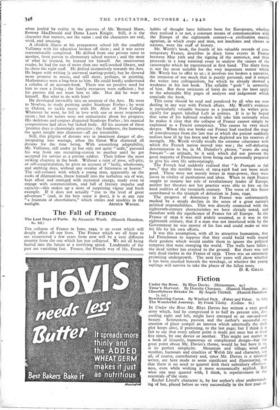The Fall of France
The Last Days of Paris. By Alexander Werth. (Hamish Hamilton. 8s. 6d.) THE collapse of France in June, 1940, is an event which will deeply affect all. our lives. The France which we all hope to see resurrected a few years from now will be a very different country from the one which has just collapsed. We are all being hurled into the future at a terrifying speed. Landmarks of the past are vanishing fast. France, the French way of life, French habits of thought have hitherto been for Europeans, whether they realised it or not, a constant means of communication with the Europe of the eighteenth century—a civilisation mainly agrarian, in which crops and men, not machines and classes or nations, were the stuff of history.
Mr. Werth's book, the fourth of his valuable records of con- temporary France, describes in diary form events in France between May roth and the signing of the armistice, and then proceeds in a long terminal essay to analyse the causes of the catastrophe which he experienced at first hand. The diary form is not the most suitable for the very important matter which Mr. Werth has to offer to us; involves too broken a narrative, the intrusion of too much that is purely personal, and it tempts the writer into colloquialism, for which he already showed a weakness in his last book. The syllable " gosh " is unworthy of him. But these strictures of form do not in the least apply to the admirable fifty pages of analysis and judgement which conclude the book.
This essay should be read and pondered by all who are now dealing in any way with French affairs. Mr. Werth's evidence is particularly valuable because as a journalist he writes prin- cipally for papers labelled Left in politics. It is to be hoped that some of his habitual readers will take him seriously when he makes it clear that the collapse of France cannot simply be explained as a Fascist conspiracy. The causes he very much deeper. When this war broke out France had reached the stage of convalescence from the last war at which the patient suddenly realises how ill he has been and how depleted are his reserves of strength. Mr. Werth vividly recalls the extreme teluctance with which the French nation moved into war ; the self-defeating determination to be, in M. Daladier's phrase, " avare du sang frangais "—an attitude, be it said, which did not prevent the great majority of FrenChmen from being each personally prepared to give his own life unhesitatingly.
The French had suddenly realised that " le Francais se fait rare," that the terrible losses of 1914-1918 had not been made good. These were not merely losses in man-power, they were losses in vitality of institutions and ideas. When in 1936 France sought to resume her role of revolutionary leader of Europe, neither her theories nor her practice were able to bite on the hard realities of the twentieth century. The sense of this fiasco contributed to the triumph of defeatism in June, 1940.
The progress of democracy in France was unfortunately marked by a steady decline in the sense of a great nation's political responsibilities. This was directly connected with the eighteenth-century characteristics we have already noted, and therefore with the significance of France for all Europe. In the France of 1939 it was still widely assumed, as it was in the eighteenth century, that if a man was not interfered with by the Government he was master of his fate and could make or mar his life by his own efforts.
It was this assumption, with all its attractive humanism, that led Frenchmen to suppose that they could build walls round their gardens which would enable them to ignore the political tempests_ that were sweeping the world. The walls have fallen ; the dead timber has crashed to the ground. But there was not only dead timber in the France of 1939. There was an extremely promising undergrowth. The next few years will show whether it has been crushed beneath the wreckage, or whether the young saplings will survive to take the places of the fallen trees.
D. R. GILLIE.


























 Previous page
Previous page